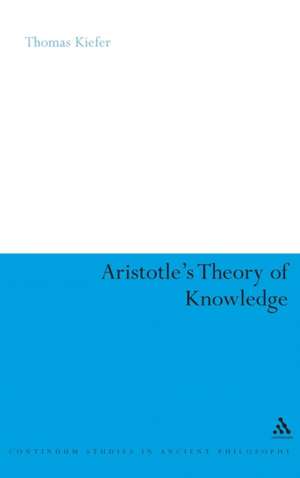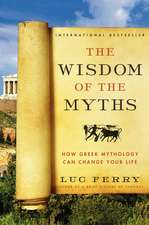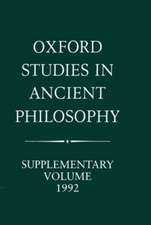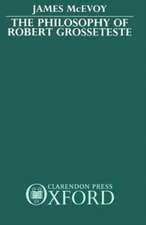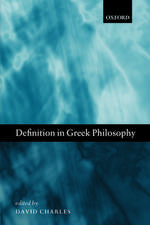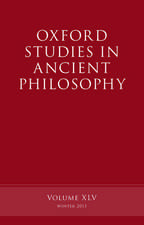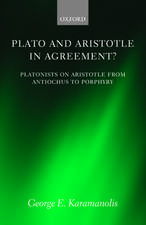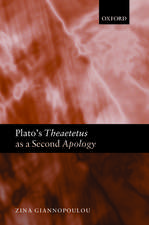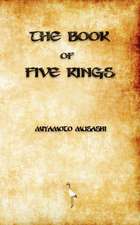Aristotle's Theory of Knowledge: Continuum Studies in Ancient Philosophy
Autor Dr Thomas Kieferen Limba Engleză Hardback – 27 iun 2007
Nominated
for
the 2009
American
Philosophical
Association
Book
Prize.
The work of Aristotle (384-322 bc) is considered to be one of the greatachievements of the ancient world, and is a foundation of both Westernand Middle Eastern philosophy and science. Although Aristotle leftsignificant material on almost all branches of learning, what hassurvived is a somewhat disorganized collection of notes and lectures.Moreover, the centuries of interpretation across various epochs andcultures tend to cloud our understanding of him.
Thomas
Kiefer
breaks
through
this
cloud
of
interpretation
and
providesan
organized
account
of
one
key
part
of
Aristotle's
philosophy,
namelyhis
theory
of
knowledge.
This
theory
concerns
what
is
knowledge,
what
wecan
know,
and
how
we
can
do
so.
Kiefer's
book
is
the
first
work
thattakes
this
theory
as
its
sole
focus
and
reconstructs
it
systematically. The work of Aristotle (384-322 bc) is considered to be one of the greatachievements of the ancient world, and is a foundation of both Westernand Middle Eastern philosophy and science. Although Aristotle leftsignificant material on almost all branches of learning, what hassurvived is a somewhat disorganized collection of notes and lectures.Moreover, the centuries of interpretation across various epochs andcultures tend to cloud our understanding of him.
Kiefer's work throughout provides many newinterpretations of key parts of Aristotle's philosophy, including an unnoticed -but crucial- distinction between knowledge in general and knowledge for us, the differences between his semantic and psychological requirements for knowledge, and'nous', which is perhaps the most obscure notion in Aristotle's work.He also concludes with a summary of Aristotle's theory in the terms andstyle of contemporary epistemology. Kiefer's work should be ofinterest to anyone involved in the history of philosophy or contemporaryepistemology.
Din seria Continuum Studies in Ancient Philosophy
- 22%
 Preț: 256.59 lei
Preț: 256.59 lei - 22%
 Preț: 1005.41 lei
Preț: 1005.41 lei - 22%
 Preț: 883.86 lei
Preț: 883.86 lei - 22%
 Preț: 897.55 lei
Preț: 897.55 lei - 23%
 Preț: 236.19 lei
Preț: 236.19 lei - 22%
 Preț: 888.81 lei
Preț: 888.81 lei - 31%
 Preț: 949.08 lei
Preț: 949.08 lei - 22%
 Preț: 947.11 lei
Preț: 947.11 lei - 23%
 Preț: 255.19 lei
Preț: 255.19 lei -
 Preț: 255.66 lei
Preț: 255.66 lei - 22%
 Preț: 889.88 lei
Preț: 889.88 lei -
 Preț: 255.11 lei
Preț: 255.11 lei -
 Preț: 256.38 lei
Preț: 256.38 lei -
 Preț: 256.02 lei
Preț: 256.02 lei -
 Preț: 256.85 lei
Preț: 256.85 lei -
 Preț: 255.66 lei
Preț: 255.66 lei -
 Preț: 255.66 lei
Preț: 255.66 lei - 14%
 Preț: 889.97 lei
Preț: 889.97 lei -
 Preț: 257.12 lei
Preț: 257.12 lei - 14%
 Preț: 946.72 lei
Preț: 946.72 lei
Preț: 891.18 lei
Preț vechi: 1282.76 lei
-31% Nou
Puncte Express: 1337
Preț estimativ în valută:
170.53€ • 178.41$ • 141.66£
170.53€ • 178.41$ • 141.66£
Carte tipărită la comandă
Livrare economică 03-17 aprilie
Preluare comenzi: 021 569.72.76
Specificații
ISBN-13: 9780826494856
ISBN-10: 0826494854
Pagini: 256
Dimensiuni: 156 x 234 x 25 mm
Greutate: 0.55 kg
Editura: Bloomsbury Publishing
Colecția Continuum
Seria Continuum Studies in Ancient Philosophy
Locul publicării:London, United Kingdom
ISBN-10: 0826494854
Pagini: 256
Dimensiuni: 156 x 234 x 25 mm
Greutate: 0.55 kg
Editura: Bloomsbury Publishing
Colecția Continuum
Seria Continuum Studies in Ancient Philosophy
Locul publicării:London, United Kingdom
Caracteristici
Tackles
many
controversial
aspects
of
Aristotle's
philosophy
and
provides
new
interpretations
of
them.
Cuprins
Introduction
Section
I:
The
Definition
and
Subject
Matter
of
Knowledge
1.
Knowledge
as
a
Kind
of
Linguistically
Expressed
Thought
2.
Knowledge
as
Hexis
3.
Knowledge
for
Us
versus
Knowledge
by
Itself
4.
Universality,
Necessity
and
Unconditionality
Section
II:
The
Semantic
Requirements
of
Knowledge
for
Us
5.
Having
a
Logos
6.
Primary
Knowledge
7.
Derivative
Knowledge
8.
Ignorance
9.
'Kath'hauto',
'Beneath
Every',
and
'For
the
Most
Part'
Section
III:
The
Psychological
Requirements
of
Knowledge
for
Us
10.
Recognition
11.
Confidence
and
the
Unthinkability
of
Mistake
Section
IV:
The
Possibility
of
Knowledge
12.
Foundations
1:
What
Makes
Primary
Knowledge
Possible
for
Us
13.
Foundations
2:
Nous
as
the
Elements
of
Primary
Knowledge
14.
Nous
and
Knowledge
by
Itself
Section
V:
Aristotle's
Theory
Outlined
in
Modern
Form
Glossary
Bibliography
Index
